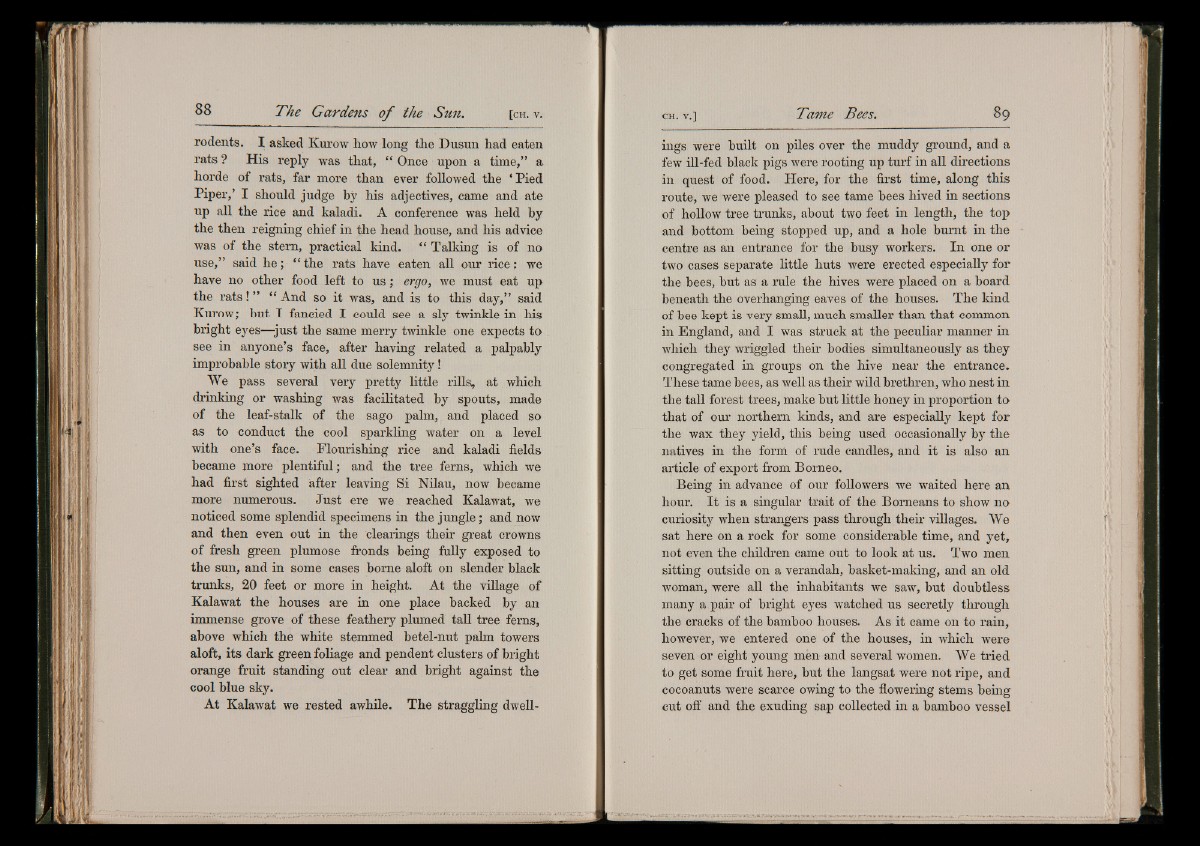
rodents. X asked Kurow how long the Dusun had eaten
rats ? His reply was that, “ Once upon a time,” a
horde of rats, far more than ever followed the * Pied
Piper,’ I should judge by his adjectives, came and ate
up all the rice and kaladi. A conference was held by
the then reigning chief in the head house, and his advice
was of the stern, practical kind. “ Talking is of no
use,” said he; “ the rats have eaten all our rice; we
have no other food left to u s ; ergo, we must eat up
the rats! ” “ And so it was, and is to this day,” said
Kurow; but I fancied I could see a sly twinkle in Ms
bright eyes—just the same merry twinkle one expects to
see in anyone’s face, after having related a palpably
improbable story with all due solemnity!
We pass several very pretty little rills, at which
drinking or washing was facilitated by spouts, made
of the leaf-stalk of the sago palm, and placed so
as to conduct the cool sparkling water on a level
with one’s face. Flourishing rice and kaladi fields
became more plentiful; and the tree ferns, which we
had first sighted after leaving Si Nilau, now became
more numerous. Just ere we reached Kalawat, we
noticed some splendid specimens in the jungle; and now
and then even out in the clearings their great crowns
of fresh green plumose fronds being fully exposed to
the sun, and in some cases borne aloft on slender black
trunks, 20 feet or more in height. At the village of
Kalawat the houses are in one place backed by an
immense grove of these feathery plumed tall tree ferns,
above wMch the wMte stemmed betel-nut palm towers
aloft, its dark green foliage and pendent clusters of bright
orange fruit standing out clear and bright against the
cool blue sky.
At Kalawat we rested awhile. The straggling dwellings
were built on piles over the muddy ground, and a
few ill-fed black pigs were rooting up turf in all directions
in quest of food. Here, for the first time, along this
route, we were pleased to see tame bees hived in sections
of hollow tree trunks, about two feet in length, the top
and bottom being stopped up, and a hole burnt in the
centre as an entrance for the busy workers. In one or
two cases separate little huts were erected especially for
the bees, but as a rule the hives were placed on a board
beneath the overhanging eaves of the houses. The kind
of bee kept is very small, much smaller than that common
in England, and I was struck at the peculiar manner in
which they wriggled their bodies simultaneously as they
congregated in groups on the hive near the entrance.
These tame bees, as well as their wild brethren, who nest in
the tall forest trees, make but little honey in proportion to
that of our northern kinds, and are especially kept for
the wax they yield, this being used occasionally by the
natives in the form of rude candles, and it is also an
article of export from Borneo.
Being in advance of our followers we waited here an
hour. It is a singular trait of the Borneans to show no
curiosity when strangers pass through their villages. We
sat here on a rock for some considerable time, and yet,
not even the children came out to look at us. Two men
sitting outside on a verandah, basket-making, and an old
woman, were all the inhabitants we saw, but doubtless
many a pair of bright eyes watched us secretly tM’ough
the cracks of the bamboo houses. As it came on to rain,
however, we entered one of the houses, in which were
seven or eight young men and several women. We tried
to get some fruit here, but the langsat were not ripe, and
cocoanuts were scarce owing to the flowering stems being
cut off and the exuding sap collected in a bamboo vessel